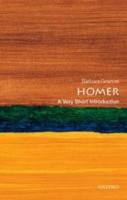
OUP (2019) p/b 122pp £8.99 (ISBN 978019-9589944)
An absolute pleasure from beginning to end, this very short introduction is much more than a ‘stimulating and accessible way into a new subject’. Starting off with Petrarch and moving effortlessly and authoritatively from ancient empires to the postcolonial world, G. takes us on a journey to understand ourselves through Homer and his audiences, and triumphs at bringing to light the significance of the poems through an astonishingly broad variety of perspectives. A particularly interesting angle is her attention to ‘non-readers’ through time, from Dante to Derek Walcott, which invites us to take a renewed look at Homer as a ‘living poet’.
The book has two main goals: to help us understand the poems themselves and to situate us within the context of their receptions. It succeeds at both. G. summarises the input of related fields of study in a succinct, accessible and inviting way, touching on linguistics, archaeology, religion, politics and geography among other disciplines. Her mastery of areas of study other than ancient Greece is best displayed in her confident treatment of comparative literature, as in the case of the Epic of Gilgamesh. When dealing with the Homeric texts, her choice of key passages in accessible English with modern and ancient responses constitutes an excellent selection from which to explore the different themes in the epics. The Homeric question is present throughout the book and skilfully synthesised, but G. masterfully interweaves it in the narrative and, refreshingly, gives the readers plenty of room for their own conclusions. Instead of producing a new theory about the author(s), she gives us a masterfully condensed overview of the complex issues at the core of the controversy. This helps the reader understand the roles of orality, resonance and authorship in the composition and transmission of the poems. There is a focus on the narrative voices, and an explicit recognition that contemporaneous aesthetic judgements have impacted our reimaginations of the poet(s). Despite its accessibility, this is the result of erudite scholarship, and all references are comprehensively cited at the end. The compelling up-to-date section on further reading manages to be extensive without overwhelming the non-specialist reader. The index at the end is equally helpful.
This book will appeal to readers of different backgrounds. For the seasoned classicist, it enriches the conversation about our ever-changing relationships with Homer. For the non-specialist, G. conveys the complexity of the originals while making those with no prior knowledge of ancient Greek feel included and meaningful in the Homeric tradition. Her prose, not shying away from technical vocabulary but highly accessible, bridges the gap between academia and the public, and the wide range of topics covered has something to pique everyone’s interest. In particular, it should be a perfect companion for A Level students, and teachers will be pleased to note that it delves into the standard syllabus, with thorough sections on authorship, background, composition and literary techniques, as well as a stimulating look into the characters and themes beautifully articulated around an overview of the plot. Her analysis of the theme of death across the epics and their receptions is gripping, and it certainly contributes to explaining the universal appeal of Homer. Overall, it contains much of the information Classical Civilisation students need but none of the less attractive factual density that one can find in some of the other short introductions currently on paperback.
Starting at the bargain price of £5.03 for a kindle edition, this is a much more affordable and portable version than the 2016 hardback, and it could become a perfect ambassador to bring classics to wider audiences. Gift it to friends, family and colleagues, and then read it once more: this introduction brings a breath of much needed fresh air to the permanence of Homer.
Ana Martin
